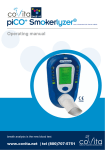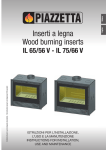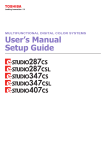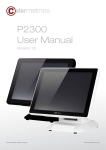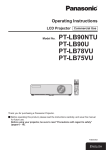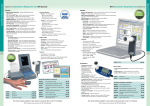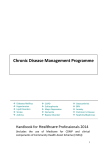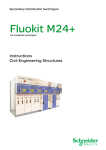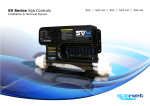Download piCO+ Smokerlyzer®
Transcript
piCO+ Smokerlyzer® Operating manual breath analysis is the new blood test English piCO+ Operating Manual Contents 1 Introduction and intended use 4 2 Quick start guide 5 3 Pack contents and specification 6 4 Instrument layout 7 5 Display symbols 8 6 Warnings and maintenance 9 7 Operation 10-11 8 Calibration 12-14 9 Set-up – User profiles 15 10 Set-up – Sounder operation 16 11Troubleshooting 17 12COdata+ software 18 13 Frequently asked questions (FAQ) 19 14 Returns procedure 20 15 Spares and warranty 21 3 piCO+ Operating Manual English Introduction Carbon monoxide is a toxic, odourless, colourless, tasteless gas. It is formed by incomplete combustion of organic material at high temperatures, with an insufficient oxygen supply. When inhaled, CO displaces oxygen in the bloodstream to form carboxyhaemoglobin (COHb). This starves the body tissues of the oxygen vital to repair, regeneration and general living. CO can remain in the bloodstream for up to 24 hours, depending on factors such as physical activity, sex, and inhalation intensity. The half life is about 5 hours. CO (ppm) and carboxyhaemoglobin (%COHb) correlation: Breath carbon monoxide is measured in parts per million (ppm) and blood carboxyhaemoglobin is measured in percentages (%COHb). The two are compatible and convertible: the CO reading relates to gas in the lungs and on the breath (i.e. the amount of poisonous CO that has been inhaled), and the COHb reading relates to the percentage of vital oxygen that has been replaced in the bloodstream. The piCO+ Smokerlyzer® displays both measurements. Clinical research has demonstrated that a useful relationship between carbon monoxide and carboxyhaemoglobin is obtained after a short period of breath-holding. 4 The cut-off point between smoker and non-smoker has been found to be 6ppm CO. The piCO+ Smokerlyzer® defines a non-smoker as 0-6ppm, a low-dependence smoker as 7-15ppm and strongly addicted smokers as over 15ppm. The piCO+ Smokerlyzer® has been designed so that it can be used with young smokers. As their smoking habits and views are generally different from adult smokers, the cut-off points have changed: 0-4ppm represents a non-smoker, 5-6ppm a light or casual smoker, and over 7ppm a more frequent young smoker. Other cut-off points can be adopted as well as smoking classification at higher CO levels. The piCO+ has a third profile which can be set by the user with COdata+ software to achieve complete flexibility in most circumstances Intended use The piCO+ Smokerlyzer® is a breath carbon monoxide monitor intended for multipatient use by healthcare professionals in smoking cessation programmes and research. It can also be used as an indicator of carbon monoxide poisoning in a healthcare environment. www.bedfont.com English piCO+ Operating Manual Quick start guide 1 Turn on the monitor by holding down the button for three seconds. 2 Attach a breath sampling D-piece and new mouthpiece. 3 Inhale and double click button to start a breath test. 4 Hold breath for the 15-second countdown. If unable to hold breath for full 15 seconds, see ‘Operation’, page 9. 5 A beep will sound during the last three seconds of the countdown. 6 Blow slowly into mouthpiece, aiming to empty lungs completely. 7 The ppm and equivalent % carboxyhaemoglobin (COHb) levels will rise and hold. The coloured LEDs will light accordingly. See the table on page 10 for an interpretation of the reading. 8 Remove the D-piece between tests to purge the sensor with fresh air. 9 To repeat the breath test, double click the button to return to main display and continue from step two, above. 10 To switch off, hold button for 3 seconds. Unit will auto power off after 5 minutes of inactivity. 5 piCO+ Operating Manual English Pack contents 1 Instrument 2 Carry pouch 2 3 User manual 4 Breath sampling D-piece 5 Disposable cardboard mouthpiece 3 6 2 × AA batteries Infection control and maintenance guidelines 5 1 4 6 0086 Specification Concentration range: 0-100ppm Display: LCD with 1ppm increments Detection principle: Electrochemical sensor Accuracy (repeatability of readings):±2% 6 H2 cross-interference: <10% Power: 2 × AA (LR6 or equivalent) alkaline batteries Response time: Typically <30 seconden to 90% FSD Operating temperature range: 0-40°C (storage 0-50°C) Operating humidity: 10-90% (storage 0-95%) non-condensing Sensor operating life: Approximately 5 years (2-year warranty) Sensor sensitivity: 1ppm Dimensions: Approximately 45 × 75 × 120 mm Weight: Approximately 200g (including batteries) Monitor construction: Body: Polycarbonate/ABS blend with elastomeric overmould D-piece: Polypropylene www.bedfont.com English piCO+ Operating Manual Instrument layout 1 7 Exhaust port for breath sample Display 2 Coloured LEDs 8 Sounder 3 Button 9 USB connector 4 Aperture for D-piece 10 Cardboard mouthpiece 5 Breath sampling D-piece 11 Battery compartment 6 Securing lug on D-piece 12 Reset button 9 13 Battery cover 11 13 12 Reset 10 8 0086 Bedfont Scientific Ltd ME1 3QX, England T: +44(0)1634 673720 F: +44(0)1634 673721 E: [email protected] www.bedfont.com 3V 2 2 1 3 4 20 2 x AA/LR6 7 5 6 7 piCO+ Operating Manual English Display symbols 1 Start up screens: 2 Battery condition: OK: Flat:Dead: 3 User profile: Adult: Adolescent: 4 Sounder: On: Mute: Custom: 5 Pointer: 6 Start breath test: 7 Enter calibration mode: 8 Enter set-up mode: 9 Inhale: 10 Breath-hold and countdown: 11 Exhale for breath test: 12 Peak CO reading (ppm and %COHb): 9. 2 13 Set instrument zero in fresh air: (only if the reset button has been pressed) 14 Apply calibration gas at 20ppm: 15 Calibration pass/fail: Pass: Fail: 16 Calibration reminder: 17 User profile selection: 18 Select adult user profile: 19 Select adolescent user profile: 20 Select custom user profile (if set via COdata+ software on PC): 21 Contact Bedfont or distributor for help: 22 D-piece reminder 23 Return: 8 www.bedfont.com English piCO+ Operating Manual Warnings and maintenance Warnings Routine maintenance People with lung disease or chest ailments may not be able to achieve the 15-second breath-hold. In such cases, the user should inhale and hold their breath when the breath test is started, and exhale, if necessary, before the countdown has completed. Calibrate the monitor using Bedfont 20ppm CO in air calibration gas when prompted by the calibration reminder on the piCO+ (see page 11). Once calibration has been carried out a reminder will reoccur in 6 months. Mouthpieces should be replaced after every use. Hands should be washed regularly in accordance with infection control practice. Cleaning Replace batteries when indicated – battery or . symbol either Replace breath sampling D-piece when prompted by the unit every 30 days or if visibly soiled or contaminated. Wipe the instrument and D-piece external surfaces with a product specifically developed for this purpose. Bedfont provides instrument cleansing wipes. The D-piece cannot be cleaned or sterilised. NEVER use alcohol or cleaning agents containing alcohol or other organic solvents as long term exposure to these vapours will damage the CO sensor inside. Batteries should be removed if the instrument is not likely to be used for some time. Under no circumstances should the instrument be immersed in liquid or splashed with liquid. Batteries Additional technical information can be made available on request; please contact Bedfont or its distributor. 9 piCO+ Operating Manual English Operation Ensure that two AA batteries are correctly located in battery compartment. •The single button controls all functions: •One long press of the button (at least three seconds) turns the unit on. •A single click scrolls the pointer through the list of options. Attach a breath sampling D-piece and a new cardboard mouthpiece to the piCO+. Check that all connections are pushed firmly together. To start a breath test, the patient should inhale and hold their breath, then a quick double click of the button will initiate a 15-second countdown display. •A quick double click selects the required option. •One long press of the button (at least three seconds) turns the unit off. Press and hold the button for three seconds until the display becomes active. Release the button. After a 10-second warm-up period, during which a start-up screen is displayed, the main menu will appear. is shown rather than the main If a menu, it means that the instrument has failed to set a fresh air zero during start-up. This may be because the ambient air was not clear of carbon monoxide. Ensure that the instrument is in fresh air, then double click the button to repeat the start-up test. If it fails again, see ‘Troubleshooting’, page 15. When the pointer is opposite the picture of an exhaling face, the piCO+ is ready to start a breath test. The green LEDs will double flash to indicate that the instrument is ready. 10 www.bedfont.com English piCO+ Operating Manual Operation (continued) Ensure that the breath is held throughout the countdown. An audio beep will sound during the last three seconds of the countdown. Once the countdown reaches zero, exhale slowly but gently into the mouthpiece. Aim to empty the lungs as much as possible. If the patient cannot hold their breath for the full 15 seconds, they should commence exhalation at a comfortable point, but exhale completely. The display will show a rising ppm value, and an equivalent %COHb reading. The coloured LEDs will illuminate, according to the selected user profile. The sounder will beep at an increasing frequency, according to the concentration of CO measured. To temporarily mute the sounder, press the button once. The highest level detected during the exhalation will remain on the display. The test is complete when the pointer and ‘return’ symbols appear at the bottom of the display. LED colour Description At this point, a single click of the button will temporarily silence the sounder, if it is on. To start another breath test, double click the button to return to the main display. A new mouthpiece should be used with every test. Removing the D-piece between tests will allow fresh air to purge the sensor. It is good practice to wash your hands after removing the D-piece. If no further tests are required, the piCO+ should be turned off by holding the button for three seconds. If left on, the piCO+ will automatically turn off after five minutes of inactivity. To re-calibrate the instrument, follow the instructions on page 11. To change the user profile from adult to adolescent (or a custom profile, if one has been set using COdata+ software), see page 3. To permanently silence the sounder during the breath-test, follow the instructions on page 14. User profile 1: Adult (ppm) User profile 2: Adolescent (ppm) GreenNon-smoker 0-6 0-4 Yellow Danger zone 7 10 5-6 1 Red Smoker 11-15 7-10 2 Reds Frequent smoker 16-25 11-15 3 Reds Addicted smoker 26-35 16-25 4 Reds Heavily addicted smoker 36-50 26-35 4 Reds flashing Dangerously addicted smoker51+ 36+ 11 piCO+ Operating Manual English 1 Calibration 2 Bedfont calibration kit 1. Fine control valve 1.5 l/m 1 1.0 l/m 0.5 l/m 2 2. Flow indicator 3. Gas cylinder, 20ppm CO in air 4. Calibration adapter and tube ●● Instruments are calibrated before leaving Bedfont. ●● Calibration reminders will prompt the user to calibrate the unit every six months ●● Double click the ●● The calibration gas required is Bedfont 20ppm carbon monoxide in air. ●● Ensure that the fine control valve is in the off position. ●● Screw the fine control valve and flow indicator assembly to the gas can. This is best done by screwing the gas can into the valve. ●● Double click on the cylinder Icon 12 3 4 ●● Immediately open the fine control valve and allow the gas to flow at 1 litre per minute. ●● To maintain this, adjust the flow so the ball in the flow indicator remains at the middle line. ●● Allow the gas to flow through the instrument for up to 1.5 minutes to ensure accurate calibration, again monitoring the rate of flow. ●● As the 20ppm CO calibration gas is applied, the displayed ppm reading will climb. After 1.5 minutes, or until no further increase in the reading is obtained, the final measured value will be shown and sampling will cease. www.bedfont.com Calibration (Manual) ●● Turn the instrument on in the normal way. When the main menu appears, scroll down to the symbol of the gas cylinder by single clicking the button. Double click to select the cylinder symbol. ●● The calibration gas required is Bedfont 20ppm carbon monoxide in air. displayed reading is outside these limits, the calibration fails, and a will be displayed (see ‘Troubleshooting’, page 17, if this happens). ●● The pointer and ‘return’ symbols re-appear at the bottom of the display to indicate that the process is complete and to allow the user to double click the button to return to the previous menu. ●● Ensure that the fine control valve is in the off position. ●● Turn off the gas flow, remove the D-piece sampling system, and disconnect the calibration adapter from the D-piece sampling system. ●● Screw the fine control valve and flow indicator assembly to the gas can. This is best done by screwing the gas can into the valve. ●● Unscrew the fine control valve and flow indicator from the gas can and store safely. If the valve is left attached to the can, the gas could escape. ●● Double click to select the cylinder symbol. ●● The piCO+ is now calibrated and ready for use. ●● Immediately open the fine control valve and allow the gas to flow at 1 litre per minute. ●● The piCO+ will prompt the user to calibrate the unit again in six months. ●● To maintain this, adjust the flow so the ball in the flow indicator remains at the middle line. ●● Allow the gas to flow through the instrument for up to 1.5 minutes to ensure accurate calibration, again monitoring the rate of flow. ●● As the 20ppm CO calibration gas is applied, the displayed ppm reading will climb. After 1.5 minutes, or until no further increase in the reading is obtained, the final measured value will be shown and sampling will cease. ●● If the displayed reading is between 5 and 40ppm, the calibration value will be automatically set in the instrument as will be displayed 20ppm and a tick to show a successful calibration. If the 13 English piCO+ Operating Manual piCO+ Operating Manual English Calibration (If Reset Button Pressed) ●● After ‘Reset’ has been pressed the unit must be switched off and on again. A light sequence will indicate it has been reset and the PiCO+ must be re-calibrated. ●● The calibration gas required is Bedfont 20ppm carbon monoxide in air. ●● Ensure that the fine control valve is in the off position. ●● Screw the fine control valve and flow indicator assembly to the gas can. This is best done by screwing the gas can into the valve. ●● Double click to select the ●● Ensure that the instrument is surrounded by fresh air. With the pointer opposite the ‘zeroing’ symbol, double click the button to set the instrument to zero. If the zeroing has been successful, a tick will be displayed. If the zeroing fails, a will be displayed (see ‘Troubleshooting’, page 17, if this happens). Double click the button to return to the calibration menu. ●● Single click the button to scroll down to the 20ppm gas cylinder symbol. Double click to select the symbol. ●● Immediately open the fine control valve and allow the gas to flow at 1 litre per minute. ●● To maintain this, adjust the flow so the ball in the flow indicator remains at the middle line. 14 ●● Allow the gas to flow through the instrument for up to 1.5 minutes to ensure accurate calibration, again monitoring the rate of flow. ●● As the 20ppm CO calibration gas is applied, the displayed ppm reading will climb. After 1.5 minutes, or until no further increase in the reading is obtained, the final measured value will be shown and sampling will cease. ●● If the displayed reading is between 5 and 40ppm, the calibration value will be automatically set in the instrument as will be displayed 20ppm and a tick to show a successful calibration. If the displayed reading is outside these limits, the calibration fails, and a will be displayed (see ‘Troubleshooting’, page 17, if this happens). ●● The pointer and ‘return’ symbols reappear at the bottom of the display to indicate that the process is complete and to allow the user to double click the button to return to the previous menu. ●● Turn off the gas flow, remove the D-piece sampling system, and disconnect the calibration adapter from the D-piece sampling system. ●● Unscrew the fine control valve and flow indicator from the gas can and store safely. If the valve is left attached to the can, the gas could escape. ●● The piCO+ is now calibrated and ready for use. ●● The piCO+ will prompt the user to calibrate the unit again in six months. www.bedfont.com English piCO+ Operating Manual Set-up – User profiles In the set-up mode, the user can change the selected user profile from adult to adolescent (or to a third custom profile, if one has been set). The user profiles determine which coloured LEDs are lit during a breath test. The default values for adults and adolescents are shown in the table in ‘Operation’, page 10. The selected user profile is indicated by the small symbol on the top line of the display: To change the selected profile, scroll the on the pointer to the set-up symbol main display, using single clicks of the button. Double click to select the set-up mode. Scroll the pointer until it is opposite the . Double click to ‘User Profile’ symbol select this function. Move the pointer until it is opposite the desired profile, then double click to select. Adult 1 The symbol on the top line of the display will change to show the selected profile. Adolescent 2 The custom profile will only be available on the display if it has been previously set using the COdata+ software on a PC. Custom 3 Exit this function by pointing at the ‘return’ symbol and double clicking. This returns you to the previous page of the menu. 15 piCO+ Operating Manual English Set-up – Sounder operation The set-up mode allows the sounder to be turned off during the breath test, although it will still operate during the breath-hold countdown. ●● Even if the sounder has been turned off, it will continue to operate during the last three seconds of the breath hold countdown. The operation of the sounder during the exhalation phase of a breath test is indicated by the small symbol on the top line of the display. ●● Exit this function by pointing at the and double clicking. ‘return’ symbol This returns you to the previous page of the menu. ●● To turn the sounder settings on or off, scroll the pointer to the set-up symbol on the main display using single clicks of the button. Double click to select the set-up mode – see previous page. ●● Single click the button to temporarily silence the sounder during or immediately after the breath test, if required. ●● Scroll the pointer until it is opposite the sounder symbol ( ) then double click to switch the sounder on ( ) or off ( ). The large sounder symbol and the small symbol on the top line of the display will change to show whether the sounder is on or off. 16 www.bedfont.com English piCO+ Operating Manual Troubleshooting ●● If the unit fails to turn on properly, or if or either low battery symbols are shown, replace both AA batteries. Ensure that the batteries are inserted the correct way around, matching the symbols moulded into the plastic. ●● If a breath test on a non-smoker gives an indication of CO being present, it may indicate a high ambient level of CO (possibly due to a faulty combustion appliance or exhaust fumes), or the effects of passive smoking. A false reading can, under certain circumstances, be caused by alcohol on a person’s breath, or the presence of hydrogen, which can be generated in the human digestive system. shows a again, the unit will have to be reset or restored using the reset button located in the battery bay followed by the reset calibration procedure on page 13. If the problem persists, please return the unit to Bedfont or your local distributor for investigation and repair. In this case, the display shows a telephone and envelope symbol. The unit can be turned off by pressing the button for three seconds. It is possible to re-start the unit and use it with the previous calibration settings, or to attempt the complete calibration process again. ●● If, after an attempted calibration with 20ppm CO gas, the display shows a , the gas value was not within the permitted limits. The achieved reading is displayed underneath the . If the value is much lower than 20ppm, there may have been a problem with the supply of gas from the cylinder during the calibration process. If the displayed value is much higher than 20ppm, it is possible that the wrong concentration of calibration gas is being used. In either case, check the cylinder, connections and flow rate before double clicking the button to repeat the calibration process. If, after a third repeated attempt to calibrate the instrument, the display 17 piCO+ Operating Manual English COdata+ software Connecting to the PC ●● Place one end of the connection lead into the mini USB socket on the top of the piCO+. Connect the other end to the USB port on the PC. ●● Before starting the software, ensure that the piCO+ is connected to the PC and switched on. Once the sensor has stabilised, double click the COdata+ icon on the PC to start the programme. ●● Refer to the supplied documentation for how to operate COdata+ software. ●● The custom user profile can only be accessed from COdata+. 18 www.bedfont.com English piCO+ Operating Manual Frequently asked questions (FAQ) Frequently asked questions about breath carbon monoxide (CO) monitoring in smoking cessation QQWhat is carbon monoxide? AACarbon monoxide (CO) is a poisonous gas that you cannot smell or see. When a smoker inhales smoke from a cigarette, CO is absorbed into their blood through their lungs. CO is dangerous because it binds to haemoglobin in red blood cells about 200 times more readily than oxygen, depriving the body of vital oxygen. QQWhat does a breath CO test show? AAIt shows the amount of carbon monoxide in a person’s breath (ppm CO), which is a measure of blood carboxyhaemoglobin (%COHb). It also acts as an indicator of the possible level of around 4,000 toxic substances in cigarette smoke, 60 of which can cause cancer. QQWhat does ppm and COHb mean? AAParts per million; in this case, one part of CO in one million parts of air (breath). This might not seem like very much, but ppm has a direct correlation with %COHb (the percentage of CO combined with haemoglobin in the blood). LED Colour Description If a patient gives a reading of 20ppm (that of a frequent adult smoker), it means that their oxygen carrying capacity is reduced by 5%. It also indicates a high level of addiction to nicotine. QQHow quickly does CO disappear from the body when a person stops smoking? AAIt takes about 5-6 hours to reduce the original level by half. Usually, after a maximum period of 48 hours, an exsmoker will have the same level of CO as a non-smoker in the same environment. QQHow long after having a cigarette should the test be conducted? AAAfter a minimum of 10 minutes. QQWhen is the best time to take a CO reading? AAThe best time to take a CO reading is as late as possible in the day. QQWhat level of breath CO do you expect to see? AAClinical research has shown that the popular guidelines are: User profile 1: Adult (ppm) User profile 2: Adolescent (ppm) Green Non smoker 0-6 0-4 Yellow Danger zone 7-10 5-6 1 Red Smoker 11-15 7-10 2 Reds Frequent smoker 16-25 11-15 3 Reds Addicted smoker 26-35 16-25 4 Reds Heavily addicted smoker 36-50 26-35 4 Reds flashing Dangerously addicted smoker 51+ 36+ 19 piCO+ Operating Manual English Returns procedure If your equipment requires servicing, please contact Bedfont’s Customer Repairs Depatment before returning any goods. If you did not purchase your monitor directly from Bedfont, please contact your local distributor or supplier. ●● When you have supplied the Customer Repairs Department with the monitor serial number and description of the fault, you will be issued with a returns number. ●● Please state the returns number on a compliment slip or headed paper when returning the monitor, and ensure that your full details, including telephone and fax numbers, are clearly stated. ●● Bedfont advise that you use a courier service when returning monitors. This enables you to insure goods for loss or damage in transit. ●● When your goods are received, you will be sent an ‘order acknowledgement’. ●● The monitor will then be examined and you will be sent an ‘Engineer’s Report’ and a quotation for the repair, which will include an authorisation form. ●● If the monitor is out of warranty and you wish to proceed with the repair or calibration, complete the authorisation form within the quotation, and ensure that you include the ‘Official Purchase Order Number’. Return the unit to Bedfont. Please contact the Customer Repairs Department if you are unable to supply an ‘Official Purchase Order Number’. ●● If you choose not to proceed with the repair, a handling fee will be charged. Ensure that you return the completed authorisation form with an ‘Official Purchase Order Number’. ●● The equipment will be returned to you as soon as Bedfont has received all relevant paperwork. A carriage fee will be charged if the monitor is no longer in warranty. ●● If your monitor is still in warranty, Bedfont will repair it and return it to you with an ‘Engineer’s Report’, free of charge. If the monitor is found to simply require calibrating, you will be charged a fee for this service if you wish to proceed. 20 www.bedfont.com English piCO+ Operating Manual Spares and warranty Spares: D-pieces Disposable cardboard mouthpieces Calibration gas and kits Instrument cleansing wipes AA alkaline batteries piCO+ exceeding Warranty: Bedfont Scientific Limited warrants the piCO+ (excluding batteries) to be free of defects in materials and workmanship for a period of two years from the date of shipment. Bedfont’s sole obligation under this warranty is limited to repairing or replacing, at its choice, any item covered under this warranty when such an item is returned, intact and prepaid, to Bedfont Scientific Limited or the local representative. These warranties are automatically invalidated if the products are repaired, altered, or otherwise tampered with by unauthorised personnel, or have been subject to misuse, neglect or accident. Never dispose of any electronic instrument in domestic waste. At the end of the product’s life, contact Bedfont or its distributor for disposal instructions. Bedfont Scientific Ltd Station Road, Harrietsham, Maidstone, Kent, ME17 1JA, England Tel: +44 (0) 1622 851122 Fax: +44 (0) 1622 854860 Email: [email protected] 21 Bedfont Scientific Ltd Station Road, Harrietsham, Maidstone, Kent, ME17 1JA, England Tel: +44 (0) 1622 851122 Fax: +44 (0) 1622 854860 Email: [email protected] www.bedfont.com Issue 10- November 2011. Part No: LAB220 © Bedfont Scientific Ltd Bedfont Scientific Limited reserves the right to change or update this literature without prior notice. Registered office: England and Wales. Registered No: 1289798 ISO 9001:2012 Cert No. FM 31664 ISO 13485:2003 Cert No. MD 502905
























